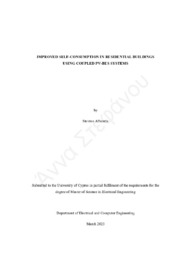| dc.contributor.advisor | Georghiou, Georgios E. | en |
| dc.contributor.author | Afxentis, Stavros | en |
| dc.coverage.spatial | Cyprus | en |
| dc.creator | Afxentis, Stavros | en |
| dc.date.accessioned | 2023-07-05T06:08:22Z | |
| dc.date.available | 2023-07-05T06:08:22Z | |
| dc.date.issued | 2023-05-16 | |
| dc.identifier.uri | http://gnosis.library.ucy.ac.cy/handle/7/65538 | en |
| dc.description.abstract | Environmental concerns about fossil fuel resources for electricity generation lead towards the integration of renewable energy sources (RES) into the modern power grid. Solar photovoltaics is the most widely used technology at the time. Despite the volatile nature of photovoltaics (PV), governments around the world encourage the integration of PV systems into the electricity network, especially for residential use. The financial incentives and governmental subsidies, along with the increasing electricity prices over the last years, resulted to the dramatic increase of residential PV systems. Furthermore, grid parity conditions combined with favourable policies for promoting PV technology such as the net-metering and feed-in tariffs, have promoted PV technology towards achieving the national energy targets.
Considering the isolated electricity network of Cyprus, the unobstructed deployment of distributed PV generation brings many challenges to the forefront that are mainly associated with the quality of the network, such as voltage and frequency fluctuations in areas with dense PV systems. In addition, the intermittent generation of PV systems due to clouds could cause voltage deviations that can compromise the stability of the network.
The adoption of energy management strategies to control the flow of PV generation is a popular solution for mitigating those issues. One approach is to use battery energy storage (BES) systems. This requires optimal sizing of the battery energy storage for local energy storage or dispatch to the low voltage (LV) grid according to load and price responsive control mechanisms to promote the storage of surplus energy for later use. For instance, the network congestion can be reduced by using the local BES system to manage peak load demand and excess PV generation. In light of this, a proper battery scheduling strategy and an appropriate BES sizing are important aspects towards building a suitable environment for residential use of BES systems.
The purpose of this master’s thesis is to analyze the energy profile of residential prosumers with a PV system in Cyprus and develop a procedure for optimally sizing the BES system in a PV-BES coupled residential system, opting to maximize the self-consumption ratio (SCR). The proposed BES sizing methodology is benchmarked with data from four residential PV-BES pilot systems installed in Nicosia, Cyprus. | en |
| dc.language.iso | eng | en |
| dc.publisher | Πανεπιστήμιο Κύπρου, Πολυτεχνική Σχολή / University of Cyprus, Faculty of Engineering | |
| dc.rights | info:eu-repo/semantics/openAccess | en |
| dc.rights | Open Access | en |
| dc.title | Improved self-consumption in residential buildings using coupled PV-BES systems | en |
| dc.type | info:eu-repo/semantics/masterThesis | en |
| dc.contributor.committeemember | Ellinas, Georgios | en |
| dc.contributor.committeemember | Charalambous, Charalambos A. | en |
| dc.contributor.department | Τμήμα Ηλεκτρολόγων Μηχανικών και Μηχανικών Υπολογιστών / Department of Electrical and Computer Engineering | |
| dc.subject.uncontrolledterm | RENEWABLE ENERGY | en |
| dc.subject.uncontrolledterm | BATTERY STORAGE | en |
| dc.subject.uncontrolledterm | ENERGY STORAGE | en |
| dc.subject.uncontrolledterm | PHOTOVOLTAICS | en |
| dc.subject.uncontrolledterm | CLUSTERING | en |
| dc.author.faculty | Πολυτεχνική Σχολή / Faculty of Engineering | |
| dc.author.department | Τμήμα Ηλεκτρολόγων Μηχανικών και Μηχανικών Υπολογιστών / Department of Electrical and Computer Engineering | |
| dc.type.uhtype | Master Thesis | en |
| dc.contributor.orcid | Georghiou, Georgios E. [0000-0002-5872-5851] | |
| dc.gnosis.orcid | 0000-0002-5872-5851 | |

